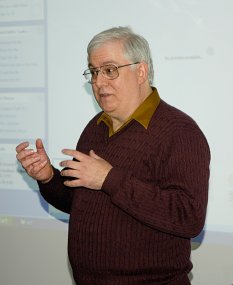 Prof Charles Smith from Western Kentucky University, USA, recently visited WIT to present a seminar entitled 'Final Causes in Nature: A Scientifically Exploitable Concept?’
Prof Charles Smith from Western Kentucky University, USA, recently visited WIT to present a seminar entitled 'Final Causes in Nature: A Scientifically Exploitable Concept?’
For the most part, science has shunned the notion of final causes, the idea that natural processes unfold according to some manner of nonrandom or “progressive” programme, or even toward a predetermined end. However, this Aristotelian concept needs not involve “first causes” or even teleology if one simply looks at the matter in terms of globally constraining influences. Indeed, many developers of the anthropic principle and gaian theory approach the question in these terms, and during the seminar a model was introduced which provided a further alternative: the notion that spatial extension may evolve as the by-product of subsystemization rules common to all of its component systems, thereby imposing certain fundamental constraints on the limits of natural organization. Examples of related simulations and empirical analyses were presented, the latter involving morphometric measures of the internal zonation of the earth, stream basins, and butterfly wings.
Prof Smith is Science Librarian and Professor of Library Public Services at Western Kentucky University in the U.S.A. His original training was in geology and geography. He holds master degrees from Indiana University (geography) and the University of Pittsburgh (library science), and a PhD in geography from the University of Illinois. Prof Smith has published work in biogeography, history and philosophy of science, systems theory, and bibliography; his books include Alfred Russel Wallace: An Anthology of His Shorter Writings (Oxford), Biodiversity Studies: A Bibliographic Review (Scarecrow), and the just-released Natural Selection and Beyond: The Intellectual Legacy of Alfred Russel Wallace (Oxford). He has also developed and maintains eleven sites on the World Wide Web, with emphases on Alfred Russel Wallace, the history of natural history, and music.

 Wessex Institute
Wessex Institute